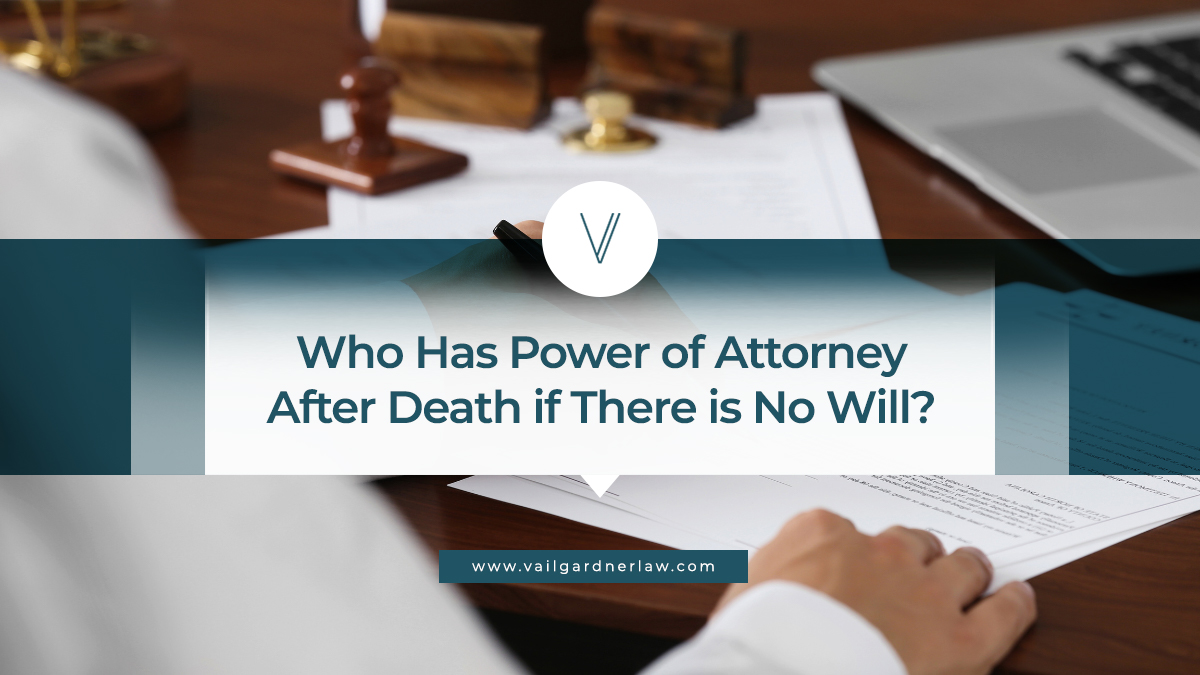When we lose a loved one, navigating the responsibilities that follow can be overwhelming, especially if there is no will in place. So you wonder who has power of attorney after death if there is no will.
Who takes control of legal matters and financial decisions after someone passes away? Many assume that power of attorney extends beyond death, but that’s not the case. Power of attorney ends when a person dies, leaving us to look at what happens next.
Let’s explore how the law handles this situation and what steps can be taken to ensure the right person manages the estate.
Who Has Legal Authority When Someone Dies Without a Will?
When someone passes away without a will in North Carolina, understanding who has the legal authority to manage their estate can feel overwhelming. If you’re in this situation, it’s important to know what happens next.
Let’s walk through the details together so you know what to expect and who steps in to handle the deceased person’s affairs.
What Happens When There’s No Will?
When a person dies without a will, it’s called “intestate.” In this case, North Carolina state intestate law decides how the deceased person’s estate is handled.
The legal process for this is the probate process, where the probate court steps in to oversee everything.
You won’t see the power of attorney agent continuing with authority after death. The power of attorney legal document only allows the agent to act while the person (the principal) is still alive.
After the principal passes, the legal authority shifts to a court-appointed estate administrator (personal representative). This person handles all the remaining responsibilities related to the deceased’s estate.

Who Becomes the Estate Administrator?
The estate administrator, also called the personal representative, is usually a family member or surviving spouse, but if no one steps up or there’s disagreement, the probate court shortly appoints someone to take on the role.
This personal representative is responsible for managing the deceased’s bank accounts, paying bills, distributing assets, and notifying creditors.
The court-appointed administrator (personal representative) has a fiduciary duty to handle the deceased’s financial affairs in accordance with local law, ensuring a smooth transition and proper closure of the probate estate.
While the power of attorney legal document power ends at death, the estate administrator’s responsibilities are set to cover various duties, ensuring that the deceased person’s affairs are managed properly.
How Does the Probate Process Work?
Once an estate administrator is appointed, the probate proceedings begin. The administrator must gather all essential documents, such as the death certificate, and start managing the deceased person’s estate.
This legal process involves:
- Submitting an inventory of the estate to the probate court
- Notifying creditors
- Settling debts
- Paying bills
- Handling taxes
- Distributing the remaining assets to heirs based on state law
- Working with the probate court to close the estate
It can be a challenging time, but the administrator’s role is crucial in ensuring that the deceased person’s wishes are respected and that any potential conflicts are resolved as smoothly as possible.
Estate administration and probate attorneys often help in such situations, guiding families through the legal process and providing clarity on the respective responsibilities.

What If There’s No Family Member to Serve as Administrator?
In some cases, if no family member is available or able to serve as the estate administrator, the court will appoint an attorney in fact or other interested parties to take on this role.
This court-appointed personal representative handles all of the deceased’s affairs, from financial matters to distributing assets, just like a family member would. Their role involves making sure that the estate is managed legally and that all interested parties are notified and involved when necessary.
Let’s make this process easier together. Start the conversation today with a FREE consultationwith Vail Gardner Law in Durham, NC. Let us help you navigate the challenges of estate administration with confidence and care.
Is There a Way to Avoid This Situation?
The best way to avoid the uncertainty of intestacy is through effective estate planning. By working with estate planning attorneys, you can create comprehensive estate planning documents that clearly outline your wishes and appoint someone to manage your affairs after death.
Whether through a durable power of attorney that handles your financial power while you’re alive or a will that manages your estate afterward, estate planning ensures that your affairs are handled as smoothly as possible during challenging times.
If you’re unsure about how to navigate these responsibilities or need more guidance, consulting with a law firm that specializes in estate administration and probate is a good step toward understanding your options.

How Does Intestate Law Distribute a Deceased Person’s Estate?
When someone passes away without a will, the distribution of their estate falls under intestate law. If you find yourself in this situation, understanding how assets are distributed can help you know what to expect.
Let’s break down the process and explain how family members receive their share of the deceased person’s estate.
Who Manages the Estate?
After the principal’s death, the legal authority granted by a power of attorney expires. The attorney document, often used for managing financial affairs or healthcare decisions, is no longer valid.
Instead, the probate process begins, and a court appoints an estate administrator (personal representative). This person, usually a close family member, steps in to manage the estate. They ensure that all debts are paid, assets are gathered, and the remaining assets are distributed according to state law.

How Does Intestate Law Determine Who Inherits?
North Carolina’s intestate laws have a clear process for determining who inherits the deceased person’s estate. The estate administrator helps distribute the assets based on the deceased’s surviving relatives.
- If there is a surviving spouse, they typically receive a significant portion of the estate, while the remaining assets go to children, if any.
- If there are no children, the estate may be shared among other close family members, such as parents or siblings.
The state has a specific hierarchy to follow, ensuring that the deceased person’s estate is fairly distributed. North Carolina law lays out exactly how intestate law works in Ch 29 of the NC General Statutes.
What If There’s No Surviving Spouse or Children?
If the deceased had no surviving spouse or children, intestate law moves to other family members. Parents, siblings, and more distant relatives may inherit based on their relationship to the deceased person.
The estate administrator’s responsibilities include making sure all family members are accounted for and notified. If no family members can be found, the state may take possession of the estate, though this is a rare occurrence.
What Happens to Bank Accounts and Financial Assets?
Under intestate law, the deceased’s bank accounts and other financial assets are distributed based on the state’s guidelines. The estate administrator will typically close accounts, settle any debts, and distribute the remaining assets among the rightful heirs.
If the deceased had a financial power of attorney while alive, that authority ends at death, and the probate process takes over. Durable POAs and other legal documents that granted authority during the deceased’s lifetime are no longer valid once the person passes away and the probate process begins.
Ensuring that your estate is managed the way you want can help avoid confusion and potential conflicts among family members. Having a clear estate plan in place ensures that your decedent’s wishes are honored and that your loved ones are taken care of according to your instructions rather than leaving it up to the legal process.
How to Avoid Intestate Succession Distribution For a Small Estate
If the estate of a deceased person in North Carolina is relatively small, you may be able to take advantage of a faster probate process known as Small Estate Administration.
This option is available when the total value of the deceased’s estate, including unpaid medical bills and other debts, is less than $20,000, or $30,000 if there is a surviving spouse.
When an estate qualifies for Small Estate Administration, you can settle outstanding debts, including medical expenses, without enduring a lengthy probate process. This can be particularly helpful if the estate doesn’t include significant assets, such as a home or retirement accounts, and you need to resolve financial matters efficiently.
Following North Carolina probate law, this process allows you to quickly handle necessary expenses like medical bills, credit card debt, and other unpaid financial obligations left by the deceased person.

Is There a Way to Avoid Intestate Distribution Through Estate Planning?
You can avoid the complications of intestate distribution by creating a legal document allowing you to decide who receives your assets.
A will or comprehensive estate plan, developed with the help of an estate planning attorney, ensures that your wishes are followed after your death. While a durable power of attorney grants authority to someone to manage your affairs while you’re alive, a will specifies what happens after you pass.
By taking steps toward understanding the power of attorney documents and working with legal professionals, you can ensure that your estate is handled according to your wishes rather than leaving it up to intestate law.
Estate Administration and Probate Attorneys Can Help
When you’re dealing with estate administration or thinking about planning for the future, having the right legal support can make all the difference.
At Vail Gardner Law, we understand that estate administration can feel overwhelming, especially if you’ve never been through the process before. The complexities of probate, combined with the emotional toll of losing a loved one, can leave you wondering where to begin.
That’s where our estate administration and probate attorneys step in to help.
Why Legal Guidance Matters
Navigating the probate process without guidance can lead to confusion, delays, and unnecessary stress. You might be managing financial affairs, handling creditors, or dealing with disputes among family members.
At Vail Gardner Law, our estate administration attorney helps you understand the legal requirements and your duties as a personal representative. With professional advice, you can ensure that you’re following the right steps, protecting both the estate and yourself from potential legal issues.
Planning for the Future
Estate planning isn’t just about having a will. It’s about making sure that your wishes are honored and that your loved ones are taken care of after you’re gone.
With the help of an estate planning attorney, you can create a comprehensive plan that includes everything from a durable power of attorney to healthcare directives. Powers of attorney allow you to appoint someone to make important decisions if you become mentally incapacitated, ensuring that your affairs are in capable hands.
We help you draft clear instructions, whether it’s for a simple estate or more complex assets. By preparing now, you save your family time and reduce the risk of conflict later.
A smooth estate plan ensures that your loved ones can focus on healing, rather than dealing with unnecessary legal battles.
Protecting Your Loved One’s Legacy
When a loved one passes, their legacy is more than just assets. It’s their memory, their wishes, and the impact they’ve had on those around them.
As estate administration and probate attorneys, we’re here to make sure that everyone honors their legacy. Whether it’s managing the estate, resolving debts, or ensuring they distribute assets fairly, we’re support you every step of the way.
Probate doesn’t have to be something you face alone. With the right help, we’ll ensure a smooth process that respects the decedent’s wishes and provides peace of mind for the family.
Get the Support You Need
At Vail Gardner Law, we understand that estate administration is not a one-size-fits-all process. Every family and every estate is different. That’s why we tailor our approach to meet your unique needs.
Whether you need help drafting a will, navigating probate, or creating a durable power of attorney, our team is here for you. We take the time to listen, offering empathy, understanding, and legal solutions that fit your situation.
Let’s make this process easier together. Start the conversation today with a FREE consultation with Vail Gardner Law in Durham, NC. Let us help you navigate the challenges of estate administration with confidence and care.

